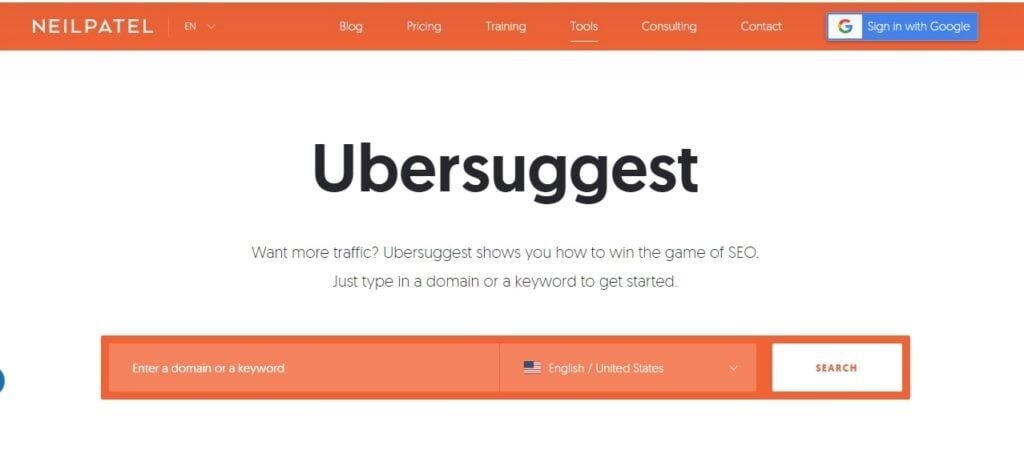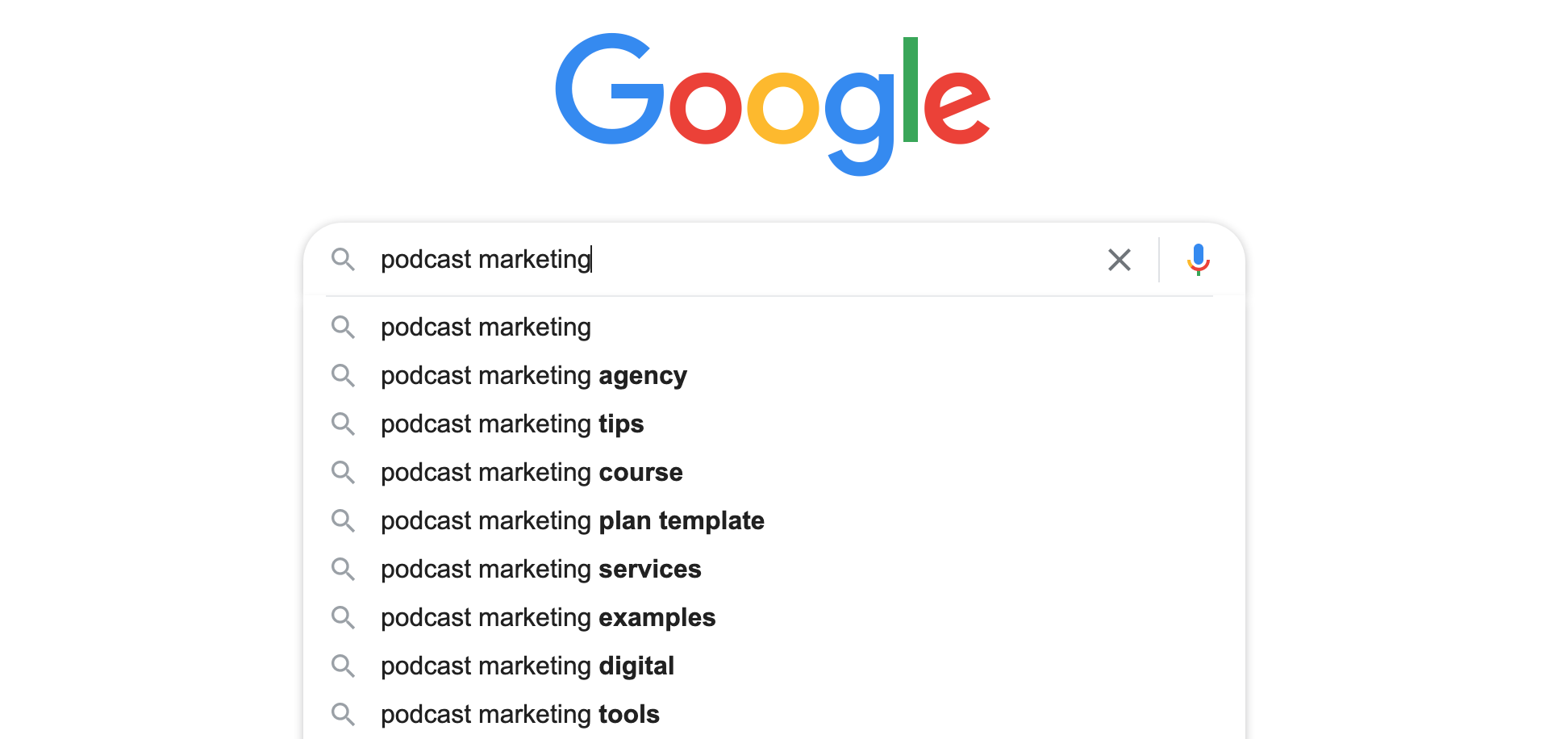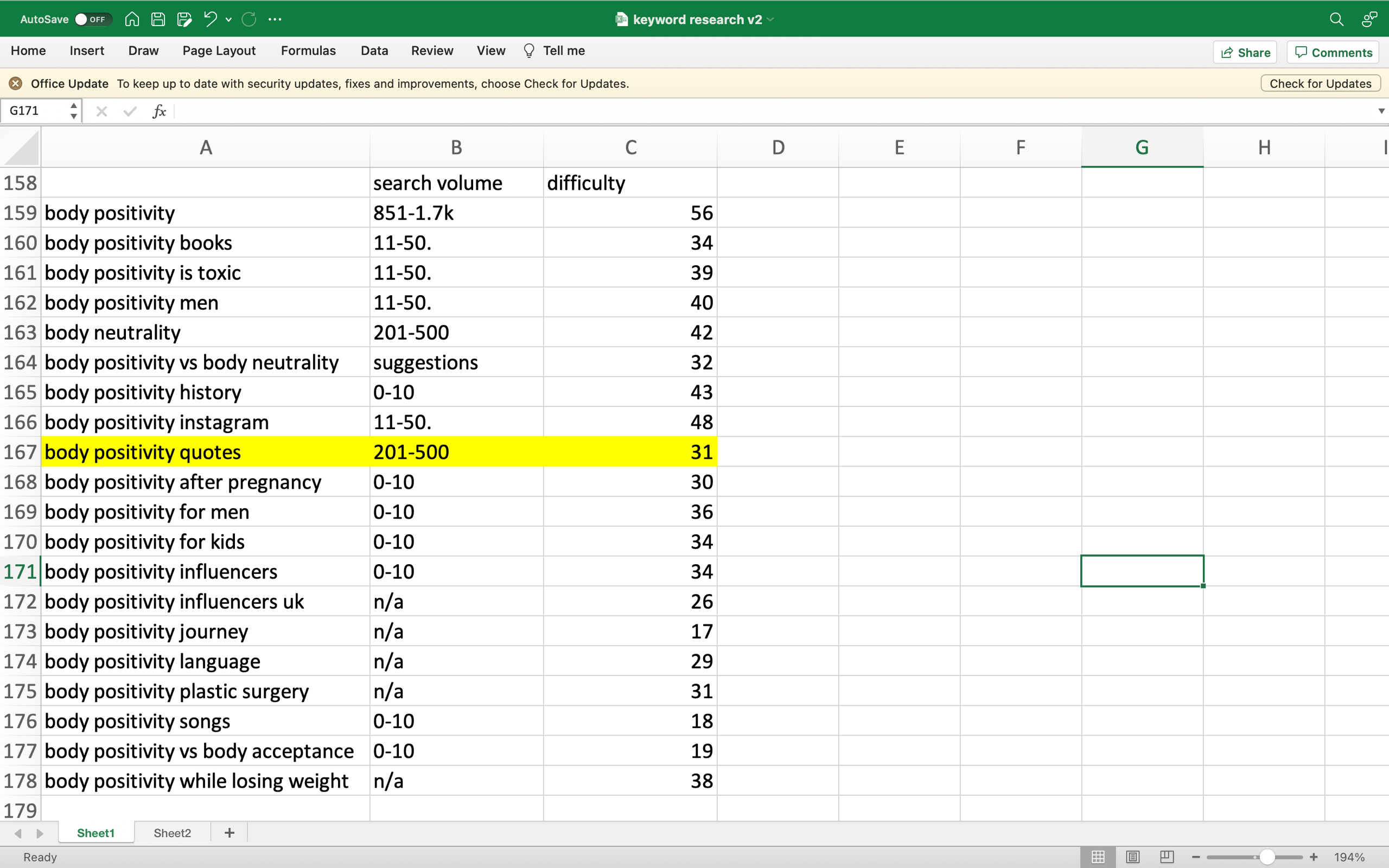If you’re serious about building a podcast audience, you’ve got to plan your content carefully. You want to make stuff on topics people are actually interested in, and you need a way for them to find it once you’ve posted it.
Keyword research can help crack both of those problems. It’s the perfect way to come up with good ideas, and it’ll help with podcast SEO (Search Engine Optimisation), which improves your chances of new listeners discovering your show.
What is Podcast Keyword Research?
A keyword is simply the word or phrase someone types into Google when searching for something online.
Keyword research is about figuring out which words or phrases you want to target with your content. The aim is to get your podcast on the first page of search results for each keyword you target. That way, people will find your podcast exactly when they’re searching for content on that topic, giving you an opportunity to win over brand new listeners.
Keyword research is important because it helps you figure out what kind of content people are interested in. Spending lots of time on an amazing episode is all well and good, but if very few people are looking for info about the topic, it’ll be difficult to draw in listeners. That’s why it makes sense to do your research first to find out what people want, so you can then tailor your content accordingly.
A Step-by-Step Guide to Podcast Keyword Research
Keyword research is actually very straightforward once you know what you’re doing. Follow these steps and you’ll soon get the hang of it.
1. Brainstorm Ideas
The first step is to get all your ideas out there. Make a list of any topics you can think of that you might want to cover on your podcast. There are no wrong answers at this stage, so don’t hold back. They can be as broad or as niche as you like.
Tip: If you’re stuck for ideas, use Reddit. Find a couple of Subreddits relevant to your podcast topic and look at the kinds of things people are posting about. Which topics get upvoted the most? Which ones crop up regularly? This is a good indication that there are listeners out there who would listen to your show if you created an episode on it.

2. Research Search Volume and Difficulty
For this part, you’ll need a keyword research tool. There are plenty of free ones out there, including Ubersuggest or Wordstream. Ubersuggest only gives 5 free searches every 24 hours, but that should be enough to get you started.

Search for each of the keywords you brainstormed and make a note of these two key metrics:
- Search volume - the number of Google searches a keyword gets per month
- Difficulty - how hard it will be to rank for that keyword, or how competitive it is
The best keywords to target will be ones with a high search volume but a low difficulty. Those are the ones that you have a shot at ranking for, and if you do rank, a significant number of new listeners will find your show.
If a keyword you’ve identified has a very low search volume (<20 per month) there is little point in creating an episode about it, from an SEO perspective at least.
Each keyword tool has a slightly different way of estimating these metrics, so the kinds of numbers you’re looking for might vary between them. But as a general rule of thumb, if you’re just starting out with podcast SEO, aim for keywords that have a relatively low difficulty score.
You won’t be able to rank for very competitive keywords until your podcast has been published consistently for years and has built up significant “domain authority” online.
3. Check Out the Competition
Once you’ve found a keyword you think will work, Google it to see what’s already on the first page. This is a good way to make sure you’re on the right track with the kind of content you’re planning for that keyword. If all the results currently ranking focus on something completely different from what you intend to produce, you might want to pick a different keyword that fits your idea better.
Typically, Google will return mostly blog posts when you search for a given keyword. This means you need to create a significant amount of associated written material to go along with your audio episode (more on that below).
If you simply upload your episode without detailed show notes or an associated blog post, you aren’t going to rank on Google.
If your goal is to rank on the first page of Google, you’ve got to beat the stuff that’s already there. This means your content must have the same level of quality and depth to it. And that’s all about meeting the searcher’s intent, which we’ll cover later on.
4. Don’t Be Afraid to Experiment
Don’t worry if you feel like all your searches during research are a bit random. The process of finding a keyword to target will involve some trial and error. As long as you’re keeping a note of the search volume and difficulty of possible keywords, you’re gaining valuable information.
If you’re struggling to think of anything, try a few Google searches. You can get some great keyword ideas from Google autocomplete, and from the search suggestions at the bottom of every results page.

This example shows keyword research done for a podcast episode about body positivity. It should give you some idea of the number of variations you could find for a specific topic once you get some inspiration going!

5. Create Written Material for Your Episode
Once you’ve picked a good keyword to target, you’re ready to make the content. You should usually only target one keyword per podcast episode.
You should only target multiple keywords per episode if they are very closely linked, for example, “podcast promotion” and “podcast marketing”. If you try to target multiple unrelated keywords within a single episode, it’s unlikely you’ll rank for any of them. You need to keep your focus narrow so Google can determine what your content is about.
Targeting a keyword is all about meeting the searcher’s intent. You want to give people exactly what they’re looking for, in the easiest and most useful format you can. So think about why someone would be googling their keyword in the first place - what information are they looking for? It’s now your job to give it to them. The better you can satisfy the likely search intent, the better your content will rank.
It’s also good practice to put the keyword throughout the content you make. Make sure to put it in these places:
- Podcast episode title / Page title on your website
- Episode chapter headings
- Episode description
- Show notes / blog post that goes with the episode
That last point is absolutely crucial. If you want your episode to rank, you need to create detailed show notes or a blog to go along with your audio episode. All the previous steps will be in vain if you fail to complete this part of the process. Check out the examples below which show both episode show notes, and an episode that has been converted into a full-length blog post.
- How to Plan Your Podcast with Colin Gray (Blog post)
- How Modern Wisdom Achieved 10X Growth (Show notes)
For more on how to repurpose your podcast into written format, check out the guides below.
- How to Create Great Podcast Show Notes
- 7 Easy Ways to Repurpose Your Podcast
- Podcast SEO: Tips to Optimise Your Episodes for Google Search
The 3 Pillars of Podcast Keyword Research
Keyword research is all about finding out what kind of content people want to see, and getting yours in front of them exactly when they’re searching for it. When picking a keyword to target, just keep these three things in mind:
- Search volume
- Difficulty
- Searcher intent
If you’re thinking about those, you’re ahead of the game. You’ll be able to give your target audience useful content on topics you know they’re already interested in and searching for.







